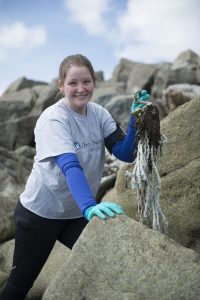
It all started with a couple of cleanups in 2000 around Earth Day. In 2001, our beach cleanup program began in earnest when we adopted Jenness Beach as part of the National Marine Debris Monitoring Program. That program has ended, but our cleanups continued, and have expanded into year-round public cleanups, an Adopt-a-Beach Program, the New Hampshire Coastal Cleanup in September, and many cleanups with schools and businesses. At our cleanups, we collect data on the litter we find so that we can use it in educational programs, develop targeted pollution prevention initiatives, and inform resource managers and litter policies.
What’s the Problem?
Litter on the beach such as cigarettes, food wrappers, straws, and bottle caps can affect marine life, who accidentally swallow them, or feed it to their young. Balloons, an item frequently found at our cleanups, can be eaten by whales and sea turtles, where they can clog the animal’s digestive tracts, making it impossible for them to eat normally. Fishing line and rope, found in high numbers at our cleanups each year, can entangle marine life, and also harm humans. We’ve often found fishing lures and hooks attached to this line on the beach – imagine stepping on this while you’re out for a stroll!
Take Action Against Marine Debris!
- Join a Public Cleanup! Check out our events calendar to see if we have any upcoming “public cleanups” in your local area and sign up to join the fight for clean beaches and seas.
- Request a cleanup led by Blue Ocean Society. We provide most of the supplies and know-how to your group and we clean the beach together. Learn more and request a group cleanup.
- Conduct your own cleanup on your own or gather your family, friends, or community. Use our cleanup guide called the Digital Cleanup Kit for safety guidance and all of our tips and tricks for a sustainable, successful cleanup. Clean a beach, pond, stream, parking lot, park, or roadside. All debris eventually makes it’s way to the ocean, and every piece collected makes the ocean a safer, healthier home for marine life!
- Submit your cleanup findings to us via the Marine Debris Tracker app or use our paper data cards. This information helps us identify the most common and troublesome debris items so we can work to identify solutions.
- If you’re picnicking at a beach or on a boat, make sure you keep control of your trash and don’t let it blow around.
- Help educate smokers on the number of cigarette butts that are around and the fact that it takes a minimum of one year for a cigarette butt to break down. If every smoker threw even one less butt on the ground every day, our beaches and sidewalks would be a lot cleaner!
- If you fish or go boating, do not throw fishing line overboard. You can also recycle your used or unwanted monofilament fishing line at one of our fishing line recycling bins. View the list to see if there is one near you!
- Learn about the items we find most on the beach by reading below and try to make sustainable lifestyle changes to avoid those products or replace them with a reusable alternative.
What Are We Finding?
In 2023, we conducted a total of 348 cleanups at 44 different cleanup sites with the help of 4,145 volunteers! Together, we collected 162,005 debris items weighing over 7,500 pounds!
- View our 2023 Beach Cleanup Data
- Download our 2022 Beach Cleanup Summary (PDF)
- 2021 Cleanup Results (ME, NH, MA)
- New Hampshire 2019 Cleanup Results
- All Cleanups (NH, ME, MA) 2019 Results
Thank You
Thank you to the following businesses who have conducted cleanups and also donated in support of our cleanup efforts.
- Liberty Mutual/Give with Liberty
- Kohls
- Altria Group
- Aquaculture Education and Research Center
- State Farm
- Sprague Energy
- Kennebunk Savings Bank
Thanks also to the New Hampshire Coastal Program for their continued support!
